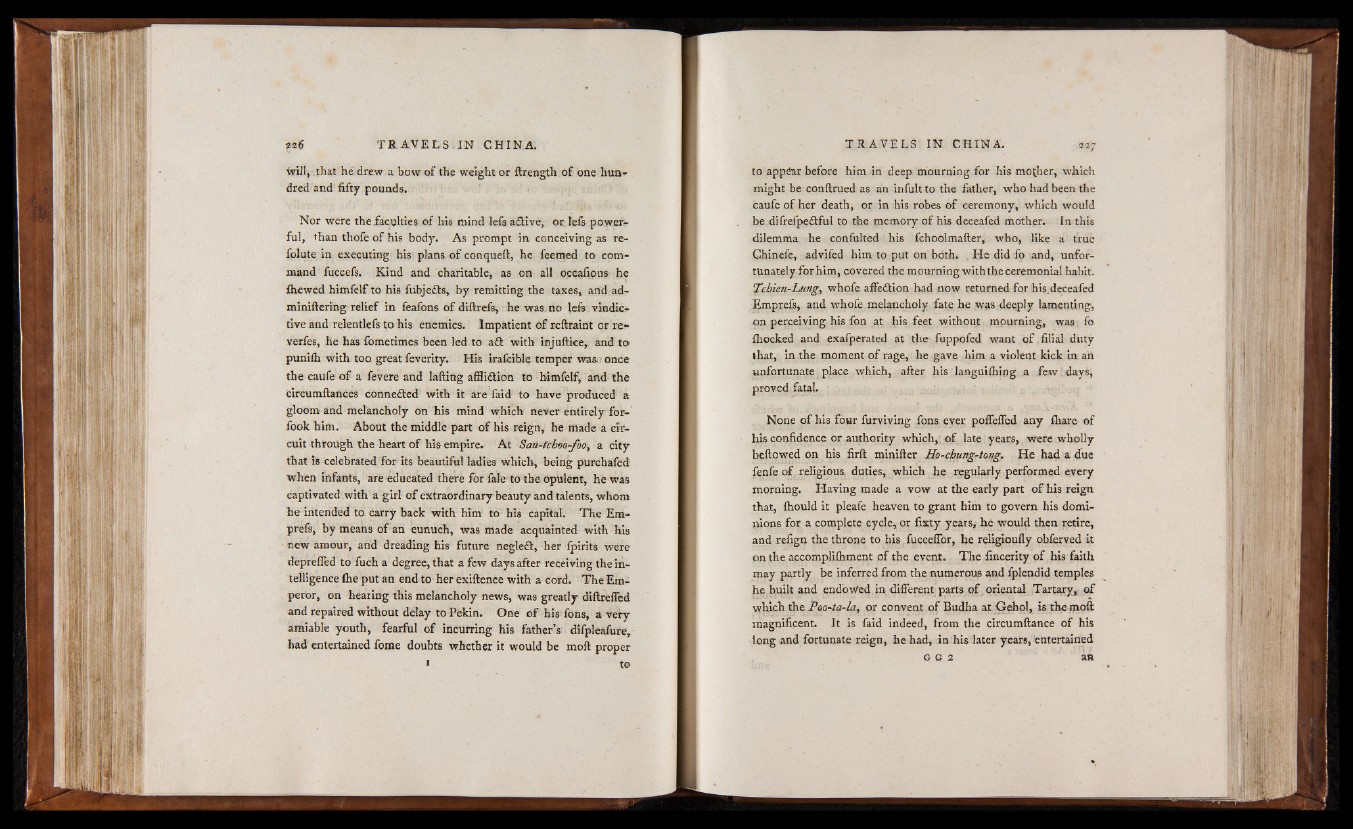
frill,- that he drew a bow o f the weight or ftrength o f one hundred
and fifty pounds.
Nor were the .faculties of his mind lefs aftive, or tefs powerful,
than thofe o f his body. As prompt in conceiving as re-
folute in executing his plans o f conqueft, he feemed to command
fuceefs. Kind and charitable, as on all occafions he
Ihewed himfelf to his fubjedts, by remitting the taxes, and ad-
miniftering relief in feafons o f diftrefs, he was no lefs vindictive
and relentlefs to his enemies. Impatient o f reftraint or reveries,
he has fometimes been led to aft with injuftice, and to
puniih with too great feverity. His irafcible temper was once
the caufe o f a fevere and lafting affliction to himfelf, and the
cireumftances connefted with it are faid to have produced a
gloom and melancholy on his mind which never entirely for-
fook him. About the middle part o f his reign, he made a circuit
through the heart o f his empire. A t Sati-fchvo-foo, a city
that is celebrated for its beautiful ladies which, being purchafed
when infants, are educated there for fale to the opulent, he was
captivated with a girl o f extraordinary beauty and talents, whom
he intended to carry back with him to his capital. The Em-
prefs, by means o f an eunuch, was made acquainted with his
new amour, and dreading his future negleft, her fpirits were
depreffed to fuch a degree, that a few days after receiving the intelligence
fhe put an end to her exiftence with a cord. The Emperor,
on hearing this melancholy news, was greatly diftreffed
and repaired without delay to Pekin. One o f his fons, a very
amiable youth, fearful o f incurring his father’ s difpleafure,
had entertained fome doubts whether it would be moll proper
i to
to appdar before him in deep mourning for his mother, which
might be conftrued as an infult to the father, who had been the
caufe o f her death, or in his robes o f ceremony, which would
be difrefpeftful to the memory o f his deceafed mother. In this
dilemma he confulted his fchoolmafter, who, like a true
Ghinefe, advifed him to put on both. He did fo and, unfortunately
for him, covered the mourning with the ceremonial habit.
Tchieti-Lung, whofe affedtion had now returned for his.deceafed
Emprefs, and whofe melancholy fate he was deeply lamenting,
on perceiving his fon at his feet without mourning, was fo
ihocked and exafperated at the fuppofed want o f filial duty
that, in the moment o f rage, he gave him a violent kick in an
unfortunate j place which, after his languiflring a few days,
proved fatal.
None o f his four furviving fons ever poffeffed any fliare of
his confidence or authority which,; o f late years, were wholly
beftowed on his firit minifter Ho-chung-tong. H e had a due
fenfe o f religious duties, which he regularly performed every
morning. Having made a vow at the early part o f his reign
that, Ihould it pleafe heaven to grant him to govern his dominions
for a complete cycle, or fixty years, he would then retire,
and refign the throne to his fucceffor, be religioufly obferved it
on the accompliihment o f the event. T he fincerity o f his faith
may partly be inferred from the numerous and fplendid temples
he built and endowed in different parts,of oriental Tartary, o f
which the Poo-ta-la, or convent o f Budha at Oehol, is the moft
magnificent. It is faid indeed, from the circumftance o f his
long and fortunate reign, he had, in his later years, entertained
g p 2 an